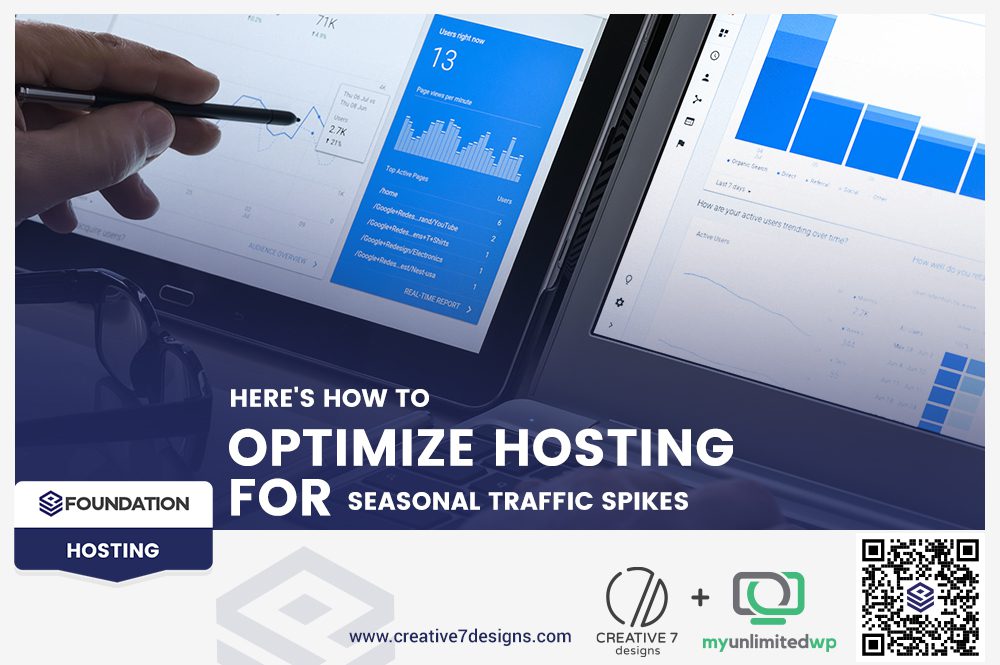Overview: Ensure your website stays fast and reliable during high-traffic periods with these hosting optimization tips. Learn how to handle seasonal traffic spikes and keep your business running smoothly! Read on!
As seasonal sales and holiday events approach, businesses often experience significant traffic surges that can overwhelm unprepared websites. Whether it’s Black Friday, Cyber Monday, or an annual promotion, these traffic spikes present both an opportunity and a challenge.
Without proper hosting optimization, your website could slow down or crash at the worst possible time, costing you valuable sales and potential customers.
In this post, we’ll explore the best ways to ensure your hosting is ready to handle high-traffic periods, keeping your site fast, reliable, and responsive.
Assess Your Hosting Plan
The first step in preparing for traffic spikes is understanding your current hosting plan. Is it shared, VPS, or dedicated hosting? Shared hosting, while cost-effective, may struggle to handle high traffic volumes. If you expect significant increases in visitors, consider upgrading to VPS (Virtual Private Server) or dedicated hosting, both of which offer more resources to accommodate larger audiences.
A scalable hosting solution is essential to prevent your website from crashing at the worst possible time.
>> Related Reading: Exploring VPS vs. Shared Hosting: Which is Right for Growing Enterprises?
Utilize Content Delivery Networks (CDNs)
A CDN is a network of servers distributed globally to deliver web content to users more efficiently. CDNs store cached copies of your website on multiple servers, allowing visitors to access your site from the server closest to their location.
This not only improves site speed but also helps distribute the load during high-traffic periods, reducing strain on your main server. Leveraging a CDN can give your users a smoother experience even during a seasonal rush.
Activate Caching
Caching is a technique that stores copies of your website’s pages, reducing the need to generate content from scratch each time a user visits. By enabling caching, you can dramatically reduce server load and improve load times. Browser caching, page caching, and object caching are all effective methods for boosting your website’s performance during high-traffic events.
Here’s a blog post on >> How Enabling Caching Speeds Up Your Website that might interest you!
Load Test Your Website
How can you know if your website is truly ready for a traffic surge? By conducting load testing, you simulate large amounts of traffic to see how your site performs under pressure. Tools like LoadImpact or BlazeMeter allow you to monitor response times and identify bottlenecks. If the test shows lag or potential crashes, it’s a sign that your hosting setup may need further optimization.
Optimize Your Website’s Code and Images
Even the best hosting service can’t save you from a bloated website. Reduce unnecessary code, compress your images, and minimize the number of plugins or third-party scripts on your site. A leaner website not only performs better during traffic spikes but also enhances user experience overall. By cutting the fat, you’ll help ensure that your site loads quickly and efficiently, no matter how much traffic you’re expecting.
Set Up Auto-Scaling
Auto-scaling allows your hosting resources to expand as traffic increases automatically. Many hosting providers offer this feature, enabling your website to handle spikes without manual intervention. With auto-scaling in place, you’ll have the peace of mind knowing that your site will scale up when needed and return to normal when traffic levels out.
Create a Disaster Recovery Plan
Even with the best preparations, things can still go wrong. That’s why it’s essential to have a disaster recovery plan in place. This includes regular backups of your site, access to emergency support from your hosting provider, and a step-by-step guide for handling crashes or other technical difficulties. A well thought out recovery plan can help you minimize downtime and bounce back quickly if problems arise.
Final Thoughts
Seasonal traffic spikes are an exciting opportunity to grow your business, but only if your website can handle the surge. By optimizing your hosting, setting up a scalable infrastructure, and performing regular tests, you’ll be well-prepared to take full advantage of increased traffic without sacrificing user experience.
So, get ahead of the game and ensure your website is ready for any surge that comes your way!


